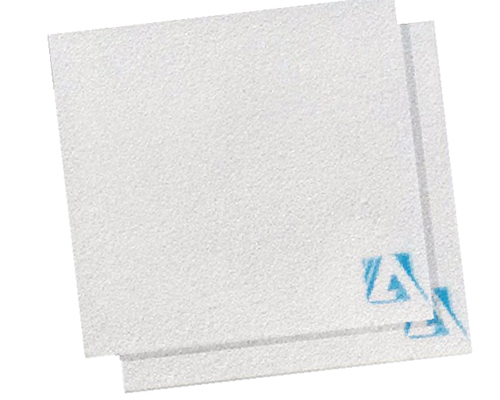The open-cell foam ceramic filter used in aluminum foundries was developed in the early 1970s, and the technology was first commercially applied in 1974 to produce rolled ingots for the manufacture of plates. Ceramic foam filters are integral, disposable filters used for single casting. The filter pore size ranges from 4 to 28 holes per centimeter (10 to 70 holes per linear inch), and the corresponding pore size is approximately 0.036 to 0.26 cm. Ceramic foam filters are usually made in square sizes, from 22.86 cm × 22.86 cm × 5.08 cm (9 inches × 9 inches × 2 inches) to 66.04 cm × 66.04 cm × 5.08 cm (26 inches × 26 inches × 2 inches). The edges are beveled and used to fit into a refractory filter bowl.
A fiber paper gasket is fixed on the beveled edge to provide a lateral compressive load to fix the filter in the filter bowl, and prevent the metal around the edge of the filter from by passing. The fibrous backing material is usually about 0.317 cm to 0.476 cm (1/8 to 3/16 inch) thick and is usually composed of silicate fibers.
In the 1980s, foam ceramic filter for foundries technology was quickly and widely accepted by the market and used for a wide range of high-quality aluminum products, including rigid packaging materials, lithographic printing sheets, aerospace products, such as plates, plates, forgings and extrusions.
For anyone familiar with the refractory materials used to contain molten aluminum and its alloys, the use of alumina particles in ceramic foam filters seems to be an obvious choice. Alumina is relatively chemically inert in molten aluminum, and it is a common alloy, including those containing magnesium. It is also widely used as a particulate material in refractory materials used in furnaces to melt and maintain molten aluminum alloys.
However, alumina has a high coefficient of linear thermal expansion (8.0×10-6/°C), and alumina monolithic shapes, such as ceramic foam filters, have poor thermal shock resistance due to the high thermal stress generated by the combination. Thermal gradient due to uneven heating and high thermal expansion coefficient. During preheating and initial molten metal contact, the ceramic foam filter material may undergo thermal shock cracking or peeling, and cause the filter material to be released into the ingot or billet, where it becomes an inclusion. In addition, when the foamed alumina filter is confined in the filter cup during preheating and use, the high thermal expansion rate of the filter will generate a large lateral compressive stress, which will result in the compression failure of the filter.

